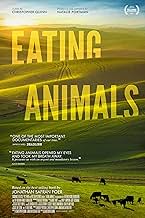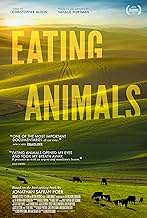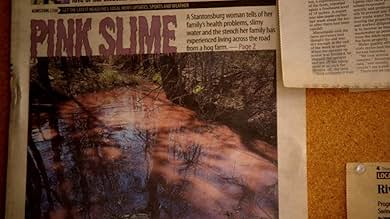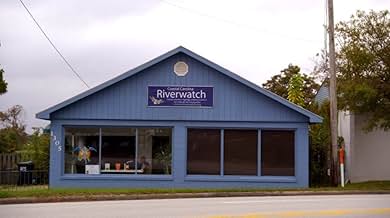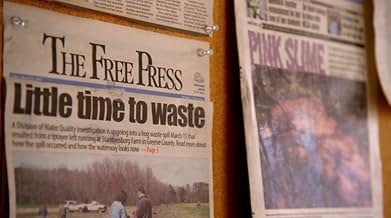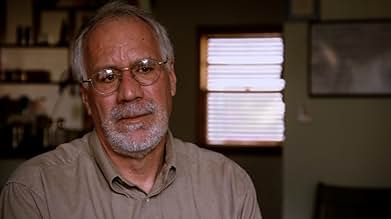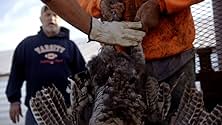AVALIAÇÃO DA IMDb
7,4/10
1,2 mil
SUA AVALIAÇÃO
Adicionar um enredo no seu idiomaAn examination of our dietary choices and the food we put in our bodies. Based on Jonathan Safran Foer's memoir.An examination of our dietary choices and the food we put in our bodies. Based on Jonathan Safran Foer's memoir.An examination of our dietary choices and the food we put in our bodies. Based on Jonathan Safran Foer's memoir.
- Direção
- Roteiristas
- Artistas
- Direção
- Roteiristas
- Elenco e equipe completos
- Produção, bilheteria e muito mais no IMDbPro
Avaliações em destaque
This truly is eye opening. We need more films and people trying to tell the truth about where their meat is coming from. I appreciate everyone who put this film together but factory farming needs to stop and it's making us all sick. This is educating the public and I thank you. Please think about these beautiful sentient souls that deserve a healthy. happy life.
Movie gives good explanation about future of farming. I like the farmers perspective and solutions they provided. As I see they predicted ongoing pandemic so I guess and I hope they are also right about reducing meat producing in the future. Everyone should watch it even of ot is or not vegetarian. It's eye opener for non vegetarians and it gives good perspective to vegetarians about farmers, they problems and possible solutions. It's also covering the true facts about why everything in the way we eat now is wrong. It's good for educational point so you can spread them to the world and try to make impact on other people to reduse meat consumption too.
'Eating Animals', is a documentary co-produced and narrated by Natalie Portman that chronicles the obstacles that several farmers across the country have in holding on to the traditions of individual farming in light of the predominant industry farming such as Tyson, Perdue, etc. Now know this...I adore beef, pork, chicken but the movie brought home to me two major facts that might actually change (baby steps!!) the way I either a) purchase meats and/or b) reduce the amount of meat I consume. Why? Well, like all good documentaries, 'Eating Animals' enlightened and educated me. Sure, I already knew that if confronted with images and knowledge of the living conditions, antibiotic use, and callous deaths, of these respective animals, I would cringe. But the movie brings up a good point-I might SAY that's inhumane, but by continuing to buy and eat then I am COMPLICIT regarding the problem. Sure, the movie paints 'big corporation' as evil (I don't subscribe to broad brush labeling), but it does drive home the fact that local farmers love their animals even though they know that the end result is that the animals they care for must serve as food. It's the process that should be indicted. I wish the movie would have delved a bit further into the many different, important topics it brings up, but, nonetheless, it educated me to a point that I went and purchased grilled 'chicken' from one of the companies spotlighted in the movie. As always, that's what I look for in a quality documentary.
Greetings again from the darkness. Our food supply and sources have become a deserved focal point of interest over the past few years, and director Christopher Quinn brings the 2009 best- selling book by Jonathan Safran Foer to the big screen to ensure we are paying attention. What began as a project looking at how animals were raised to fulfill the demand for edible meat, evolved into an analysis of traditional farming methods versus today's prevalent factory/big corporation farming. We learn that the growing demand for affordable and convenient food in the 1970's really kicked off the factory farming industry, and now it's roughly 99% of the market. Only 1% of farmers resisted and survived (as farmers).
"We eat meat not because of how it's produced, but in spite of it." Consumers demand delicious, affordable and convenient food, and the film looks at beef, chicken, turkey, pigs and dairy. We are told that factory farming began accidentally thanks to an overshipment of baby chicks several decades ago. Farming and our food supply haven't been the same since. There is some rare behind-the-scenes footage from factory farms that is difficult to watch. Narrator and Producer (Oscar winning actress) Natalie Portman talks us through the disgusting "pink lagoons" of hog poop, as well as how the raising of animals for food is said to be responsible for up to half of climate change, and for having a significantly negative impact on air pollution and water quality.
Of course most people, when asked, are against animal abuse and geological degradation so what goes on "inside" the barns remains confidential and secure. Going behind the doors of Confined Animal Feeding Operations, we witness conditions and actions that we would prefer not to see. We are informed that 80% of the anti-biotics being produced go towards farm factory animals, and the goal is to modify normal growth size and speed by 4 times. With this approach comes increased risk of pandemics, superbugs, and flu viruses. That's our tradeoff for the delicious, affordable and convenient demands.
The USDA comes under attack here as well. The agency is accused of silencing the whistleblowers who are doing the job the agency was created to do. They are now 'protecting the fox, not the hen house'. This is all tracked back to politics and money from the big corporations affiliated with or benefitting from factory farming. Some old clips of Col Harland Sanders (of KFC fame) proves even he was concerned about this many years ago.
Emotion comes into play here as the connection of traditional farmers to their animals is contrasted to the mass production of farm factories. Industry secrecy and protection is presented as a red flag, and the independent farmers are shown as good guys while the giant corporations remain faceless and (mostly) nameless. Only towards the end of the film do we gain some insight into the research being conducted on meat replication through plant-based systems. It's brilliantly compared to the early days of "gas light substitute" as a name for Edison's electricity. We are told that India and China now combine to total almost 3 billion people, and their diets are trending towards that of the U.S. - leading to more pressure for faster and cheaper food. Traditional farming isn't even taught in school these days, and the film barely touches on the always on-going debate between "humanely" raising animals for food vs. veganism. The film succeeds in showing us the problems, but doesn't offer much in the way of solutions or even a better way ... although it's clear one is needed.
"We eat meat not because of how it's produced, but in spite of it." Consumers demand delicious, affordable and convenient food, and the film looks at beef, chicken, turkey, pigs and dairy. We are told that factory farming began accidentally thanks to an overshipment of baby chicks several decades ago. Farming and our food supply haven't been the same since. There is some rare behind-the-scenes footage from factory farms that is difficult to watch. Narrator and Producer (Oscar winning actress) Natalie Portman talks us through the disgusting "pink lagoons" of hog poop, as well as how the raising of animals for food is said to be responsible for up to half of climate change, and for having a significantly negative impact on air pollution and water quality.
Of course most people, when asked, are against animal abuse and geological degradation so what goes on "inside" the barns remains confidential and secure. Going behind the doors of Confined Animal Feeding Operations, we witness conditions and actions that we would prefer not to see. We are informed that 80% of the anti-biotics being produced go towards farm factory animals, and the goal is to modify normal growth size and speed by 4 times. With this approach comes increased risk of pandemics, superbugs, and flu viruses. That's our tradeoff for the delicious, affordable and convenient demands.
The USDA comes under attack here as well. The agency is accused of silencing the whistleblowers who are doing the job the agency was created to do. They are now 'protecting the fox, not the hen house'. This is all tracked back to politics and money from the big corporations affiliated with or benefitting from factory farming. Some old clips of Col Harland Sanders (of KFC fame) proves even he was concerned about this many years ago.
Emotion comes into play here as the connection of traditional farmers to their animals is contrasted to the mass production of farm factories. Industry secrecy and protection is presented as a red flag, and the independent farmers are shown as good guys while the giant corporations remain faceless and (mostly) nameless. Only towards the end of the film do we gain some insight into the research being conducted on meat replication through plant-based systems. It's brilliantly compared to the early days of "gas light substitute" as a name for Edison's electricity. We are told that India and China now combine to total almost 3 billion people, and their diets are trending towards that of the U.S. - leading to more pressure for faster and cheaper food. Traditional farming isn't even taught in school these days, and the film barely touches on the always on-going debate between "humanely" raising animals for food vs. veganism. The film succeeds in showing us the problems, but doesn't offer much in the way of solutions or even a better way ... although it's clear one is needed.
The truth always prevails! If this doesnt make you consider becoming at least vegetarian, then, i dont know whats wrong with you. Get your morals straight.
Você sabia?
- CuriosidadesAs a result of her involvement in the film, narrator Natalie Portman alongside her entire family, adopted a vegan lifestyle.
- Citações
Self (Center for a Livable Future): We are creating the perfect storm. I mean, it's, it's not if, it's when there's going to be another really dangerous flu virus.
Principais escolhas
Faça login para avaliar e ver a lista de recomendações personalizadas
- How long is Eating Animals?Fornecido pela Alexa
Detalhes
- Data de lançamento
- Países de origem
- Central de atendimento oficial
- Idioma
- Também conhecido como
- Мясо
- Empresas de produção
- Consulte mais créditos da empresa na IMDbPro
Bilheteria
- Faturamento bruto nos EUA e Canadá
- US$ 149.614
- Fim de semana de estreia nos EUA e Canadá
- US$ 34.524
- 17 de jun. de 2018
- Faturamento bruto mundial
- US$ 153.993
- Tempo de duração1 hora 34 minutos
- Cor
Contribua para esta página
Sugerir uma alteração ou adicionar conteúdo ausente

Principal brecha
By what name was Eating Animals (2017) officially released in Canada in English?
Responda

